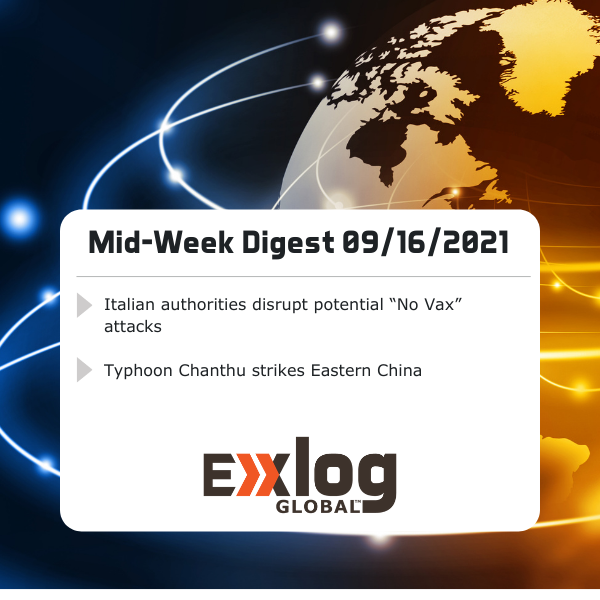Italian authorities disrupt potential “No Vax” attacks and Typhoon Chanthu strikes Eastern China
Italy: Security forces raid homes of eight anti-vaccine activists over online threats of targeted violence
On Sept. 9, Italian authorities raided the homes of eight anti-vaccine activists under investigation for planning coordinated violent attacks during protests over the country’s COVID-19 pandemic response measures. The development highlights the threat of targeted violence motivated by growing animosity toward these restrictions. Orchestrated by the Milanese Public Prosecutor’s office and DIGOS (the Italian anti-terrorism agency), the raids targeted individuals believed to be part of the Italian “No Vax” movement in their hometowns of Milan, Rome, Bergamo, Reggio Emilia, Venice, and Padua. The suspects allegedly planned to carry out attacks at anti-COVID vaccine passport protests in major Italian cities using “weapons and rudimentary explosives.” Various weapons—including two pistols, two long guns, two sets of brass knuckles, a blackjack, a katana, and pepper spray—were recovered during the raids. As of Sept. 15, the official investigation was ongoing, and none of the eight suspects have been formally arrested or charged. Authorities initially identified the suspects by their chatter in the Telegram channel “I Guerrieri” (“The Warriors”), where they had openly plotted to target journalists at anti-Green Certificate protests in Rome on Sept. 11, while encouraging others in the group to carry out similar attacks against the Health Ministry. Though these particular suspects were unable to successfully execute an attack, several Italian journalists have been assaulted over the past few weeks while covering No Vax protests – suggesting an ongoing, specific threat of targeted violence. The pool of potential threat actors is likely small but highly motivated. According to a University of Milan study, staunch anti-vaccination views remain firmly in the minority (roughly 3%), but nearly half of the population is opposed to mandates that would prevent unvaccinated individuals from accessing public spaces. Furthermore, violent threats made by No Vax adherents have increased in recent weeks, and future attacks cannot be ruled out in the near term. The Italian phenomenon of anti-vaccine rhetoric is also visible in several European countries and is likely to persist in the months ahead as governments grapple with the highly transmissible COVID-19 Delta variant. Protests, some resulting in violence, have occurred in other countries across the continent—especially France, Greece, and Poland—over domestic pandemic health precautions.
China: Typhoon Chanthu causes significant disruptions in Shanghai and surrounding provinces, further stresses global supply chains
Typhoon Chanthu severely disrupted transport and logistics operations in eastern mainland China, especially Shanghai, as it passed over the area on Sept. 13. The slow-moving storm—which was downgraded from Category 5-equivalent super typhoon status before reaching China—brought strong winds and up to 400mm (15.75 in.) of rain to northern central Zhejiang, Shanghai, southern Jiangsu, and southeastern Anhui provinces. Between 70-150mm (2.75-5.5 in.) total rainfall accumulation was forecast in Shanghai from Sept. 13-15. Chanthu forced the closure of both major airports in Shanghai, in addition to seaports, trains, subways, and schools in and around the city from Sept. 12. Rail and flight services were suspended throughout cities in neighboring Zhejiang Province, which issued severe weather and flood warnings for nine districts. Notably, cargo operations at Shanghai and Ningbo-Zhoushan ports (two of the busiest container ports in the world) were also interrupted. Local media outlets report that flights at Shanghai’s Pudong and Hongqiao international airports had normalized as of late Sept. 14, though knock-on disruptions remain possible. Likewise, port workers have once again begun handling laden containers late Sept. 14; however, even such a brief suspension due to Chanthu is likely to exacerbate extensive shipping backlogs caused by previous shutdowns within the last quarter. Operations at certain Nigbo-Zhoushan terminals were shuttered in July due to Typhoon In-Fa and again in August after a worker tested positive for COVID-19. Coupled with record-high demand, these interruptions have further strained global supply chains. As of late Sept. 15, now-Tropical Storm Chanthu is forecast to track east-northeast through the East China Sea over the coming days, and to impact southern South Korea as well as the Japanese Islands of Kyushu, Shikoku, and Honshu beginning Sept. 17. Given the storm’s weakened state, severe disruptions and damage are relatively less likely to occur in these areas.


